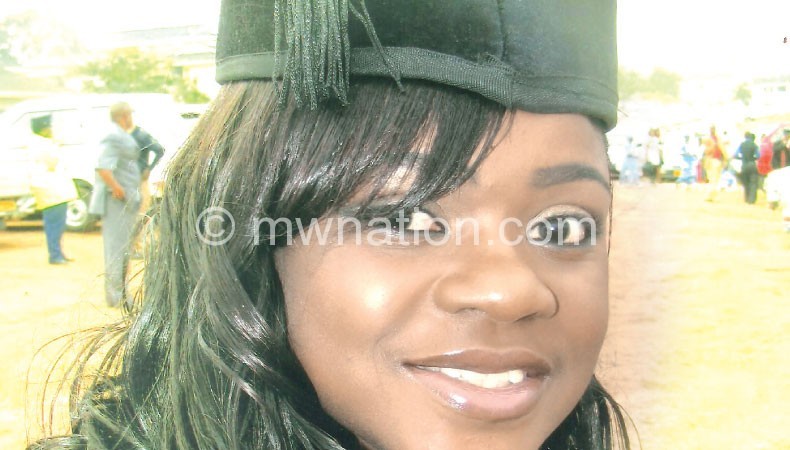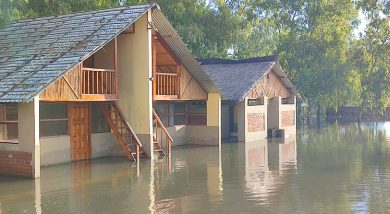Big Interview: Lilly Musaya

Born to Ephraim and Faith Musaya in Blantyre 26 years ago, little did her parents know she would rise up the social ladder so quickly to head an international organisation. She grew up aspiring to become a social scientist or a lawyer, but having studied media for development at Chancellor College (Chanco), she tells us in this interview that she could not have picked a better job involving working towards enhancing socio-economic change in many women on the continent as she now runs an agribusiness alliance for women in 12 countries. Excerpts:
—————————————————————————————-
Q. So, who is Lilly Musaya
I am a young professional working as a head of programmes at Women in Agribusiness in Sub-Saharan Africa Alliance (Wasaa)—a non-profit organisation registered in May 2010 in Mozambique. I was born in Blantyre and I am a single mother of a three- year-old daughter Simone Yewo Kaunda. I come from Machinjiri in Blantyre and run my personal business called Angelstone, registered in October 2013.
Q. Briefly tell me about your family
I am the fourth born in a family of five— three older sisters and a younger brother. My Father worked as a data processing manager for a local bank before he retired into business. He grows tobacco in Mchinji.
My mother was a secretary before she also retired into business. She is now into real estate, but is also a farmer. She grows soya and ground nuts. As it is, an agri-business environment has been in my family for a long time. Anglestone also trades in agriculture commodities. The firm is currently a member of Auction Holdings Commodities Exchange (AHCX), therefore sells commodities on the AHCX platform.
Q. What about your education?
I did my primary school at Lilongwe Pentecostal before moving to an international school in South Africa for my high school and later to Bishop Mackenzie. I went to Chancellor College (Chanco) in 2007 where I studied for a bachelors degree in media development studies. I graduated with humanities as my major in 2010.
Q. Did you always aspire to be agribusiness?
Not really. Actually it was a bit confusing probably because I didn’t know what I wanted to become. At first, I aspired to become a lawyer following my uncle’s footsteps. He encouraged me and I even enrolled with the law school at Chanco, but it appeared I wasn’t meant for the profession. There was also a time I wanted to become a political scientist, but my father chose media studies for me. In my confused state, I might have had my reservations, but I don’t regret going for it. Whatever instinct my father had then; he was right!
Q. What does your job at Wasaa entail?
Basically, I coordinate or manage projects. The institution has active chapters in Eastern and Southern Africa including Malawi, Kenya, Tanzania, Uganda, Zambia, Zimbabwe, Rwanda, Swaziland, South Africa, Angola, Burundi and Mozambique. Wasaa is working to bring growth to women and youth- owned businesses to help them graduate from micro to medium scale and to large scale enterprises in the region. Its mission is to serve as an institutional vehicle to spearhead economic independence and widen opportunities for women and youth in agribusiness and in agriculture as a whole. Our goals are to enhance women’s capacity to participate in business and trade through the facilitation of national and regional joint ventures.
Q. How did you find yourself at Wasaa?
I first came here as an intern in my college days. It was during the internship that I authored several project proposals, some of which the Alliance for the Green Revolution in Africa (Agra) approved and now funds. The proposal was awarded funding in February 2013, bringing in the first donor funding into Wasaa. Wasaa then called me back, in part, to help champion the projects whose proposals I had authored.
Q. What drives you?
I have always wanted to help promote socio-economic change in mankind, especially women and I always insist agribusiness is the way to go. Dealing with small scale farmers helped me to understand their needs better and explore ways of how best to help them out. Economically empowering women through various social activities sourced locally is what I call job satisfaction; to me at least.
Q. What are your success stories?
There may not be many, but at least I’m proud to be associated with them. In June 2013, I authored another proposal for Wasaa, submitted to Rural Livelihoods Economic Enhancement Project (RLEEP), which was also awarded funding in December 2013. This project will benefit 6 000 smallholder women farmers in Malawi. Under this project 300 women smallholder farmers in Salima in 2013/2014 growing season were able to grow on the Chikwawa scheme under the green belt initiative; hence, have access to 550 hectares of land on the scheme as well as constant technical extension support.
The project, funded by Agra and being implemented in Malawi and Zambia, is benefitting 4 000 women farmers in the two countries. Through this project, women farmers have been able to produce for structured markets that require larger amounts and better prices. Two contracts have been obtained so far with Malawi government supplied by the women; worth $1 million (about K412 million). This has brought about increased incomes of up to 300 percent in some cases for the farmers.
Q. What are some of your career achievements?
My promotion to programmes manager for Wasaa. I was also nominated by practitioners working in agriculture in Malawi to represent the country in a steering committee that has been put together to formulate a network of practitioners working in the fields of gender and agriculture in southern Africa. The network is called southern Africa Region Gender Network (SARGnet). It is a network that institutionalises gender in agricultural development through capacity building, information documentation and sharing of best practices, carrying out gender responsive research to achieve gender equity. The committee comprises 12 personnel coming from Malawi, Zambia, Mozambique and South Africa.
Q. I’m sorry, Lilly, but I feel I still have to ask you. How do you explain your being single and having a child?
I believe people should not get married simply because there is a baby involved. If the couple has other “irreconcilable” differences, the marriage will be problematic. My child’s father and I did not agree and this is alright with me—with us. We have a civil relationship and I respect him as somebody who has had some influence on the person I am today.
Q. How does it feel to be a single mother?
It was a challenge at the beginning as it was something I had not prepared for mentally. But my daughter has been a great motivation for me to succeed as I want to provide for her abundantly. Now that I have her, I believe there is no greater title I will ever have in my life than that of “mother”, even if I were to become president one day.
Q. What aspirations do you have for her?
I want her to do all the good things and live to her best ability. Unfortunately, life is not predictable as to guarantee my availability for her during that moment she will have to make some critical decisions in life. But I believe children should be left to choose what they want, although there’s no harm in providing guidance. I just want to be there for my child, throughout life.
Q. And for yourself?
The sky is the limit. I plan to go for my masters degree soon before I venture into new grounds and by new grounds I don’t mean abandoning agribusiness. It should be noted that I was once offered the position of chief executive officer (CEO) at Wasaa, but I excused myself; I had to gain some experience first. But I’m not rushing; I’ve got all the years to come and only God knows where our collective efforts will take us all to.






Q: “I’m sorry, Lilly, but I feel I still have to ask you. How do you explain your being single and having a child?”
Fatsani Gunya is VERY RUDE to ask this question, so directly. The reporter could have been more discrete in the questioning, and still tease out an answer. Lilly Musaya is so confident in herself she gave a credible and a down to earth answer. And there is nothing shameful about her situation; she is succeeding in life in spite of….
Her being single and having a kid has absolutely nothing to do with the subject at hand. Attitudes change with the times, even in Malawi, abale. Professional journalists, especially of the women gender, should chastise him or her. Bad boy/girl!